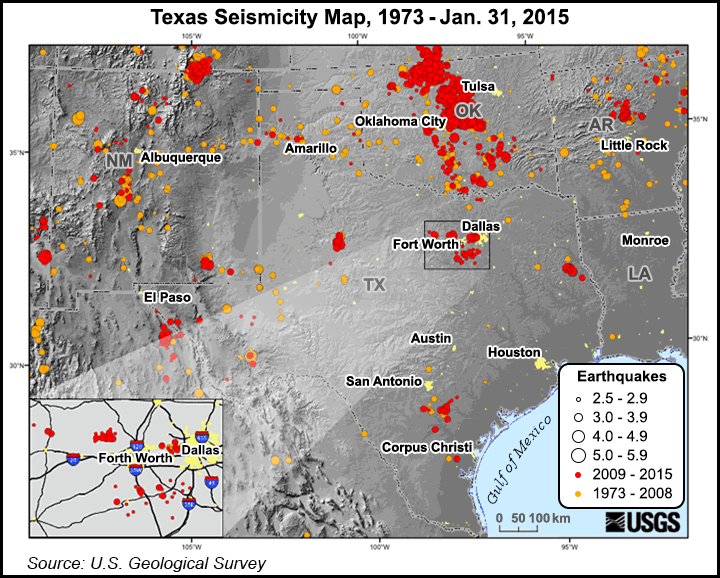Shale Daily | E&P | NGI All News Access | NGI The Weekly Gas Market Report
Quakes Are Natural, Not From Injection Wells, XTO Tells Investigators
Frequent seismic activity near the Barnett Shale towns of Azle and Irving in Texas is naturally occurring and cannot be blamed on drilling waste injection wells, ExxonMobil Corp. unit XTO Energy representatives said during a show cause hearing in which the company made a case for keeping its area injection well operating.

During his presentation to Railroad Commission of Texas (RRC) hearing examiners Wednesday, XTO attorney Tim George said the company’s SWD Well No. 1 injection well disposes of drilling fluids in the Ellenburger Formation and serves about 230 producing wells in the vicinity that are producing from the Barnett Shale.
The Ellenburger Formation is far below the Barnett, George said, adding that the Barnett provides “a natural geological barrier” above the Ellenburger and keeps the disposed fluids from migrating upward. He said there have been no material changes in pressures associated with the company’s disposal well and that the well is properly cased and cemented.
George went on to say that the tectonic movements in the region have been understood by researchers for decades. “Those movements are naturally occurring,” he said at the hearing in Austin.
Earlier this year the RRC scheduled show cause hearings for XTO and for EnerVest Operating LLC, whose hearing is scheduled for next week. Commissioners said they were responding to a study by seismologists at Southern Methodist University (SMU) that linked earthquakes with injection wells (see Shale Daily, April 24; April 21). A rule change on injection wells made last year at the RRC added seismicity as an area of concern and one where action could be taken by the regulator (see Shale Daily, Oct. 28, 2014).
Andree Griffin, XTO vice president of geology and geophysics, testified that the seismic activity in the area is naturally occurring and is not related to injection well activity. She said the quakes originate from a zone in the earth far deeper than what is posited by the SMU researchers.
Whatever comes out of the XTO hearing and the EnerVest hearing next week could take months to finalize as a recommendation for RRC commissioners. The show cause hearings are viewed as an unusual step by at least one energy industry attorney.
“…[T]he chatter certainly around the [operator] community is that a show cause proceeding is a very serious proceeding, and it requires a tremendous amount of resources and time by these operators to come into that hearing in a very defensive posture, and they’ve got a fairly tall order ahead of them,” Bracewell & Giuliani’s Scott Sherman told NGI’s Shale Daily recently (see Shale Daily,May 4).
© 2024 Natural Gas Intelligence. All rights reserved.
ISSN © 2577-9877 | ISSN © 1532-1266 | ISSN © 2158-8023 |
